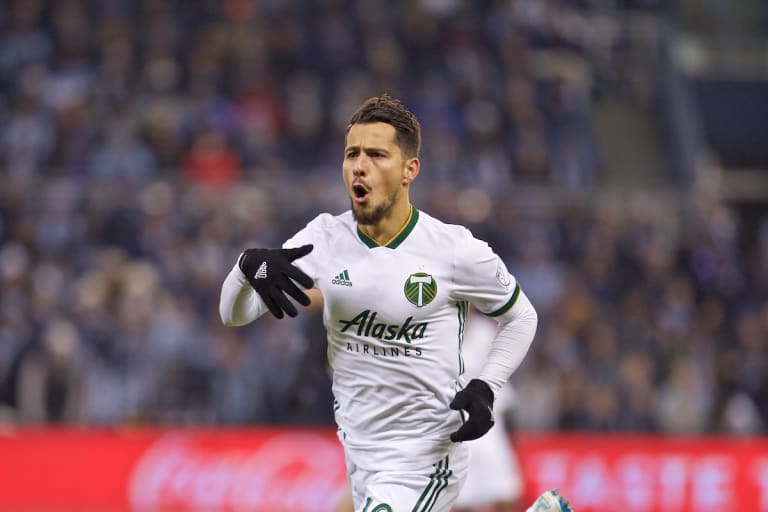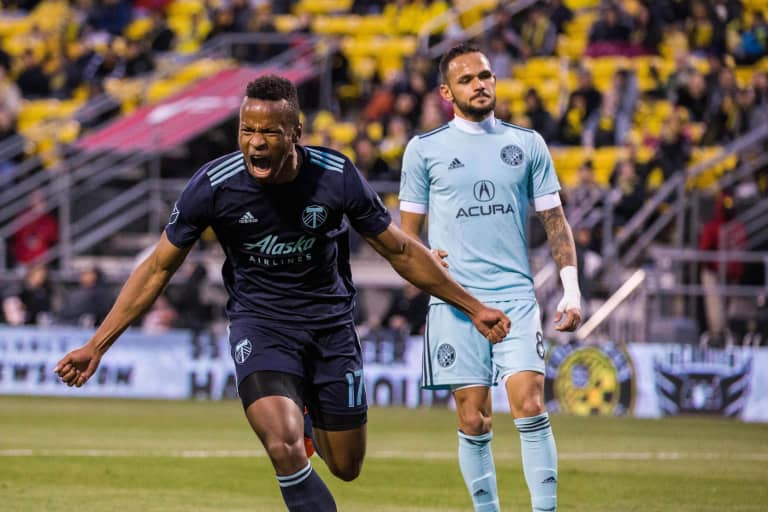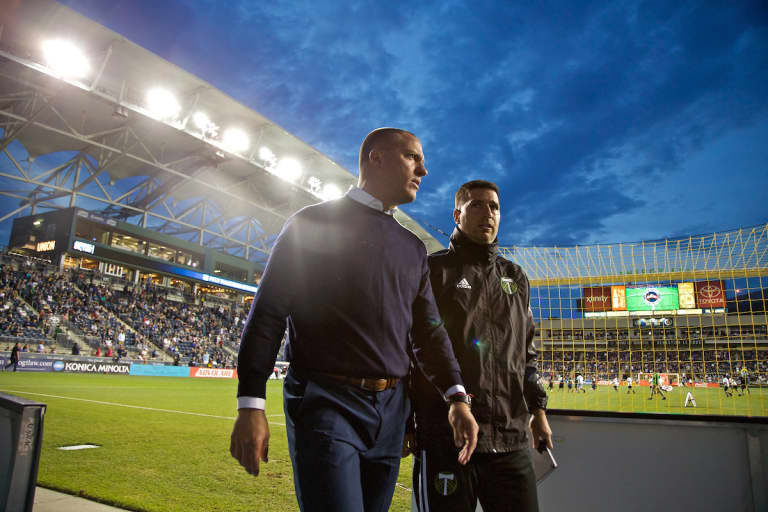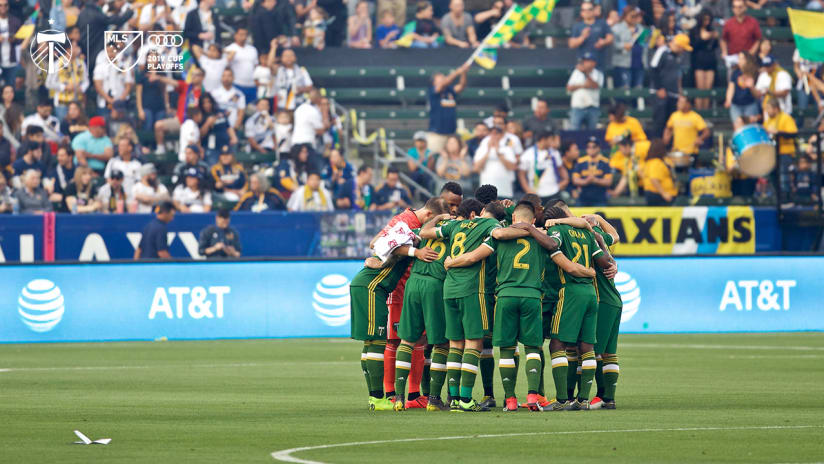BEAVERTON, Ore. – When the t-shirts were made, they carried a tone of inspiration: the phrase Guerreros del viaje – roughly translated as road warriors – on the front; the mileage, duration and number of games in the Portland Timbers’ season-opening road trip stacked down the back. The gold letters on black fabric implied something simple: that the misfortunate of el viaje, the trip, could also serve as a cause for cohesion.
It’s not like the team had much of a choice. With their home stadium, Providence Park, enduring the final phase of a two-year renovation – one which expanded its capacity by around 25 percent, to 25,218 – home games wouldn’t be an option until June. But the season started in March, meaning for 12 games spread across 13 weeks, the team would have to play away from home. Before the season, a certain dichotomy emerged, albeit a reductive one. The Timbers would either embrace their challenge or be defined by it.
Guerreros del viaje was an attempt to choose the former, but the legacy of 2019’s start will forever be more complicated; and ultimately, not very consequential. By the end of their three-month obstacle, the team had earned the right to move on, having bounced back from a potentially catastrophic beginning to reach a type of equilibrium. Would the record-setting stint be a positive, or a negative? Turns out, neither. In the end, it just was.
The path to that end, though, forced the Timbers to acknowledge their hangover from a surprising strong 2018 postseason run. It forced them to recognize the depths their 2019 could reach, as well as the lessons the team failed to learn from their previous road struggles, 12 months before. But it also forced them to rally, find the part of them capable of authoring their own narrative, and recapture what carried them into a new season with confidence.
Portland’s 12-game road start ultimately forced them to live up to the t-shirt they’d created. Guerreros del viaje. And if, this year, the Timbers are to reach a third MLS Cup final, they’ll have to recapture what made them Warriors of the Journey.
-----------
The birth of the phrase dates back to the end of the 2018 campaign, when an inconsistent regular season had put the team at a disadvantage going into MLS’ playoffs. If the team was to make a second Cup final, they’d see each of their likely playoff opponents hold home field advantage. If they won their Knockout Round game at FC Dallas, they’d have to overcome the second of a home-and-home Conference Semifinal against Seattle Sounders FC. And if that went well, the same circumstances would arise against Sporting Kansas City, in all likelihood, in the conference final. Even MLS Cup was probably going to be on the road, with Supporters’ Shield-winning Atlanta United FC looming for whomever survived the West’s playoff labyrinth.
The playoff schedule meant Portland only had three days to make it from Vancouver, the site of the team’s final regular-season game, to Dallas. Even then, few were surprised when a Diego Valeri brace allowed the 10-man Timbers to reach the next round, winning 2-1. When Portland then advanced past Seattle, it felt like the type of result you get in a derby. With the Timbers having won at CenturyLink Field earlier that season, Portland’s victory in the playoffs always felt possible.
It was when the team claimed the edge in Kansas City, with Sebastián Blanco’s legendary, long-distance shot finding the goal, that the guerreros feel started to take hold. Sporting had been the West’s team during the regular season, and inundated by ice and snow in the days before the conference final’s second leg, the field at Children’s Mercy Park needed round-the-clock attention to approach playable. When Valeri capped Blanco’s stunner with two second-half goals, the road warrior mentality took root.

Sebastián Blanco after scoring in Audi 2018 MLS Cup Wester Conference Championship (Craig Mitchelldyer / Portland Timbers)
Strictly, guerreros del viaje doesn’t mean road warriors, even if the translation feels natural from an English speaker’s point of view. To make that translation in this season’s context, though, would miss an important part of the phrase. For the Portland Timbers, el viaje – the trip, or the voyage – always had the potential to be a definitional part of the season. No team had ever began with as many games on the road.
It’s a subtle distinction, but one that became more and more important as the season’s first three months unfolded. When the 2019 campaigned opened on March 2, guerreros felt like the focus word, but as time passed and air miles stacked up, the viaje loomed, if not the el. Colorado to Los Angeles, Cincinnati back to L.A., then San Jose. Soon the voyage felt less like a lower-case trip than something that deserved a title of its own.
Six weeks into the season, with the Timbers holding the worst record in Major League Soccer, el viaje became El Viaje – something that threatened to define the team’s entire 2019. Whatever reputation Portland had acquired during 2018’s postseason run was being squandered over the new season’s first months.
-----------
It was “a terrible start to the season,” Zarek Valentin admits. Like many of his teammates, Valentin’s being asked about the phase from the shirt.
It’s over a week before the Timbers will board a plane to Utah and face Real Salt Lake in the Rounde One of the Audi 2019 MLS Cup Playoffs (7pm PT, ESPNews), with Portland having secured its postseason return on the last day of the regular season, five days before. Once it arrives, the Utah trip will be only the second time the team has had to leave Portland since the middle of August.
They’ve gotten used to life at home. Perhaps a little too used to it. By the time their schedule evened out and the back load of home games had passed, Portland had a record of 8-5-4 at home. Devoid of context, it’s a fine mark, but for a team that’s traditionally had a large home field advantage, it felt like a disappointment, particularly when their long home run dangled like a carrot during the downs of el viaje. Of the 14 teams that would end up qualifying for MLS’ postseason, no team had more home losses.
Those five losses, though, match the number Portland accumulated during the first six weeks of their road trip, dropping five in a row after a season-opening draw in Colorado. In February, a schedule that featured games at LA Galaxy, FC Cincinnati, San Jose Earthquakes and FC Dallas presented a chance for a decent start. Nobody expected four wins from those games, but those were opportunities. One or two victories in that spell would start a recipe for survival.
Instead, the Timbers would lose each of those games, falling by a combined score of 10-2 in the wake of a lopsided loss at Los Angeles FC. Halfway through el viaje, the guerreros had yet to show up.
“How do I explain it,” Sebastián Blanco asks, rhetorically, hinting his thoughts on guerreros del viaje are complicated, now. “The beginning of this year, it just felt so long. But in a way, because the trip started so poorly, it forced us to live up to that nickname.”
The rebound actually started with the last loss, a 2-1 defeat at FC Dallas that left Portland feel wronged by the mistaken interpretation of a late handball (the league’s referees association would later admit a penalty should have been awarded when Dallas’ Ryan Hollingshead committed his foul in the penalty area). It gave the team a strange, almost paradoxical sense of momentum going into the next week’s game: in Columbus; against a Crew team sitting near the top of the Eastern Conference; facing the team’s previous head coach Caleb Porter.
By the time the team reached Ohio, they were 0-5-1 and had lost the luxury of defining the game in terms of their former boss. What transpired there, though, was the first sign that the guerrero mentality had survived. First-half headers from Larrys Mabiala and Jeremy Ebobisse were capped by a stoppage time goal from Jorge Moreira, delivering not only the team’s first victory of the season but also momentum that Portland would carry throughout the rest of their road trip.
The next week in Toronto, in the face of star Alejandro Pozuelo’s historic start in MLS, Portland won, 2-1. The week after that, another 2-1 victory, this time at Real Salt Lake. The streak stalled the next week in Vancouver, where the team was shutout, 1-0, but come the end of their 12-game spell, the guerreros had produced a record they would have accepted, had somebody forecast it three months before. Capping the viaje with a 3-1 win in Philadelphia – where the Union had yet to lose a game in 2019 – Portland opened the renovated Providence Park with a 4-6-2. The guerreros had survived their war.

Jeremy Ebobisse scores against Columbus (USA Today Sports Images)
“Listen, I really loved the second half, but the first half sucked.” Valentin is still unrelenting. During the team’s slow start, he was one of the most frustrated Timbers, in disbelief that he and teammates hadn’t learned from what happened the year before.
In the team’s first season under their new head coach, Giovanni Savarese, Portland opened with a smaller version of el viaje. The first stage of Providence Park’s renovations cast the team on the road for the first five games of 2018. When the first game in Goose Hollow arrived come April 14, 2018, Portland was 0-3-2, had suffered an embarrassing 4-0 defeat at the New York Red Bulls, and looked little like the team that finished the previous regular season on top of the Western Conference.
2019 was different, though. Instead of adjusting to a new coach, the team was adjusting to the lack of an offseason. Having made a run to December’s MLS Cup final, most players had time to take a small break, tend to holiday festivities with their families and then, in the middle of January, jump back into their life in professional sports.
“The first five games, I think we had a little bit of a hangover from the final,” Valentin concedes. “I would say that we had two weeks off, literally, before we had to get back into it. I know for most people that may seem like a lot, but considering we basically work year-round physically, that’s not much of a break physically and mentally.”
Portland’s second half at Los Angeles FC on March 10, their second game of the season, felt like a mental break. A competitive game that was 2-1 at the hour mark was a 4-1, 11-on-10 affair 12 minutes later. The next week, the mental break seemed to continue. The Timbers lost at expansion FC Cincinnati, 3-0. Two weeks later, the mental break continued, then snapped. A 3-0 loss at San Jose still marks what players cited as the low point of their season.
For Savarese, time allows a more positive perspective.
“When I hear the phrase guerreros del viaje,” he begins, in Spanish, when given the same prompt as his players, “it means that it is a group of people who have had the opportunity to travel a lot and have managed to overcome the difficulty that always presents a team when you travel too much. The group has become a warriors because they had to try and get results in the face of failure.”
This is more than the luxury of time, and results. In the wake of the San Jose disappointment, Savarese spoke of wakeup calls, as well as his team’s opportunity to show their fortitude. When the team was handed misfortune against Dallas, Savarese refused to let his team be defined by their record, insisting their underlying play spoke to the Timbers’ improvement. Consistently, has strands of Portland’s narrative allowed for other stories, Savarese has maintained the perspective of somebody planning beyond a 34-game season. He maintained the perspective of a coach.
“In truth, in the past I’ve always tried to foster the idea that a team has to be as strong at home as it is on the road,” Savarese explains, when asked about the road mentality of his former teams. “But, I have never had the opportunity to play 12 consecutive, continuous games away from home, especially with the difficulty of travel and travel times in Major League Soccer. So, for sure, [the year] was surely a unique case for me.”

Timbers head coach Giovanni Savarese talks with assistant coach Miles Joseph in Philadelphia (Craig Mitchelldyer / Portland Timbers)
If the Timbers didn’t affirm their guerreros status over the second-half of their road trip, they likely did so over the remainder of their home schedule. On July 7, Portland became the only team to win at New York City FC this season, defeating the eventually Eastern Conference regular season champions 1-0 at Yankee Stadium. The next week, the Timbers won at Banc of California Stadium in the U.S. Open Cup, eliminating LAFC from the competition two rounds after winning on the road against Seattle. On July 21, the Timbers registered another road win over the Sounders, taking a 2-1 victory out of CenturyLink Field that would mark one of only two home losses Seattle would suffer this season.
Philadelphia, NYCFC, LAFC and Seattle would finish the regular season a combined 45-7-16 at home. Although only one of Portland’s visits to those teams came during El Viaje, those results defined the Timbers’ season on the road. Only two teams finished the regular season with more wins than Portland’s six on the road.
“If we’d played with the same intensity at home that we ended up playing with on the road, it would have been a lot better,” Blanco says. “In the playoffs, I hope we can continue playing like this, but even so, at a very difficult time, the team showed a lot of fortitude. Head-to-head, in must-win matches, we’re not a team you want to face.”
Why, exactly, the Timbers become that team on the road, nobody knows for sure. Valentin’s theory is that the team “have an influx of guys with young children, so they enjoy sleeping on the road. I know I’m going to be one of those guys,” the new father said.
“Obviously, at home we hold ourselves to a high standard,” he explains. “We want to perform in front of our fans, so we put that pressure on ourselves. On the road, the other teams have to do that. They have to perform in front of their fans. They need to put on a show. They have to do all that jazz, and we’re going to sit here and rope-a-dope a little bit, hopefully catch them on some breaks.
“I think, a few games, we’ve out-played a lot of the home teams. But it doesn’t necessarily always guarantee results.”
If there’s an overriding lesson the guerreros can take from 2019, it’s in those lack of guarantees. In all likelihood, the Timbers are no greater “warriors” than they were seven months ago, but seven months ago, they needed a reminder, one that went beyond rallying cries and t-shirts. Come July, the Timbers may have reaffirmed their guerreros del viaje credentials; in October, though, that cliché is only as true as the team’s next result.












